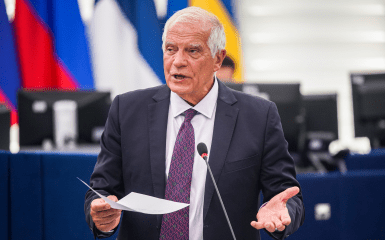On March 18, the European Union declared that it does not recognise the so-called Russian Federation's "presidential election" in Ukraine's occupied territories.
The EU reacted to the pseudo-elections in Russia
The EU published a statement on behalf of Josep Borrell, the EU's High Representative for Foreign Affairs and Security Policy.
The statement says that "the elections held by Russia on March 15-17 took place in a minimal environment, which was also exacerbated by Russia's illegal war against Ukraine."
Russian authorities continue to intensify systematic internal repression by suppressing opposition politicians, civil society organisations, independent media and other critical voices with repressive legislation and politically motivated prison sentences. The shocking death of opposition politician Alexei Navalny on the eve of the elections is another sign of acceleration and systematic repression.

Josep Borrell
EU High Representative for Foreign Affairs
The EU regretted not allowing OSCE observers to attend the "elections". They noted that this contradicts Russia's obligations to the OSCE.
The European Union also condemned the illegal holding of so-called "elections" in Ukraine's territories temporarily occupied by Russia: in the Autonomous Republic of Crimea and the city of Sevastopol, as well as in parts of the Donetsk, Luhansk, Zaporizhzhia, and Kherson regions.
The so-called "elections" in these territories are another clear violation by Russia of international law, in particular the UN Charter, of the independence, sovereignty and territorial integrity of Ukraine.
It was repeated there that the European Union does not recognise and will never recognise the holding of these so-called "elections" on Ukraine's territory or their results.
They are void and cannot have any legal effect. Russia's political leadership and those involved in their organisation will bear the consequences of these illegal actions, the statement said.
Fake elections in the Russian Federation: what is known
Mock elections in the Russian Federation were held on March 15-17.
The Central Election Committee of Russia announced that it had processed 99.75% of the protocols. Putin is expected to receive more than 87% of the vote in the Russian elections.
The result means Putin, 71, will begin a new six-year term, overtaking Joseph Stalin to become Russia's longest-serving leader in more than 200 years.




